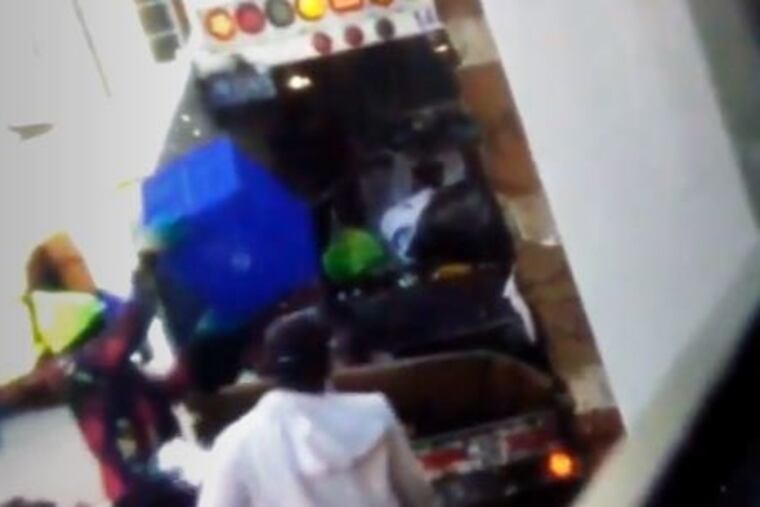Philly residents frustrated as some see recycling still gets dumped with trash
Matt Gerst has watched for weeks from his South Philly home as Streets Department workers take his carefully separated recycling and dump it in with trash. He's had enough.

Matthew Gerstman has watched for months as crews from Philadelphia’s Streets Department have sporadically taken his carefully separated plastics, cans, and cardboard for recycling and dumped it in with the trash.
Initially, he accepted that the city had to take extraordinary measures amid turmoil to waste collection created by the COVID-19 pandemic. But he wonders why it’s continuing.
“For the past month, I would say every collection but one they’ve thrown the recycling in with the trash,” said Gerstman, who has lived in South Philly for a decade. “So I videotaped them last time.”
In a video Gerstman shared with The Inquirer, workers can be seen emptying blue recycling buckets into a trash truck. The Inquirer has not published the video as Gerstman is wary of identifying individual workers.
“In the scope of all the crises going on in the country, and the world, I know it’s not so earth-shattering,” he said. “But if the city has a legitimate recycling program … then just what is it doing?”
Streets Department crews began mixing recyclables in with trash in the spring and summer as the volume of residential trash grew following stay-at-home orders, while at the same time, more workers were calling out after testing positive for COVID-19 or quarantining.
The city said it had a plan to catch up, but residents say the problem has continued through late fall. The recent resurgence of the coronavirus has caused more hiccups, said Scott McGrath, the city’s environmental services director.
» READ MORE: Philly mixed recycling in with trash to deal with backup, but city says it will catch up
The Inquirer has heard from residents in various neighborhoods, and over a period of months, to say they’ve witnessed their recycling getting dumped.
Josh Landow, who wrote to The Inquirer in October that his separated recyclables were being mixed in with trash, said this week it now “seems intermittent” in his West Philly neighborhood.
Landow said he has “no idea what to expect week to week.”
McGrath acknowledges workers are still mixing recyclables but said it’s happening far less now than over summer when the department was so short-staffed.
Back then, the city was figuring out how to handle a big spike in the amount of residential trash because so many people were working and eating at home as businesses and restaurants shut down or curtailed operations.
The city fell behind in collections as a result, causing major disruptions in service, and leaving piles of trash on streets for days. To catch up, workers began hauling curbside recycling away in trash trucks.
In response, the city hired 150 temporary workers and 10 full-time staff to plug holes. McGrath said it took until early November to get everyone on board.
“We had gotten back to close to normal operations on trash and recycling,” McGrath said, but not 100%. Now, Philadelphia’s recent surge of COVID-19 is reigniting disruptions, though the city has more workers to help this time.
On Tuesday, McGrath said crews mixed only about a dozen loads of trash and recycling.
“Our goal is not to leave anything on the ground,” McGrath said.
No one particular neighborhood gets different treatment, he said, adding that it depends on staffing for individual routes. The Streets Department coordinates about 200 trash and 70 recycling routes.
By Thursday, he said, operations should be back to normal but will still depend on staffing. He dispelled the notion that the city was not picking up recycling in order to save money. The Kenney administration, he said, is committed to recycling and has no plan to stop.
“We have more than sufficient funds from a budget standpoint to handle the recycling,” McGrath said. “We’re going to do everything we can to keep collecting it.”
Philadelphia pays about $65 per ton to dispose of trash with its contractor, Waste Management. The trash goes to a landfill or is incinerated at a waste-to-steam plant.
The city pays the same company about $100 a ton for recyclables, but that fluctuates based on the market. Just several years ago, the city was getting paid for its recycling.
» READ MORE: Philly will spend record amount in 2020 to have recycling hauled
The market for recycling, especially plastics, aluminum, and steel has been down, McGrath said. One bright spot: cardboard and paper, known in the recycling business as fiber, have been a better sell on markets.
That comes as more and more homes are placing cardboard from Amazon and other delivery services in recycling buckets.
To better understand how to handle the entire stream, the city has launched a study of the composition of its trash. Once those data are in, it will study recycling.
“We’re also taking a broader look at our operations to see how we can manage things more efficiently,” McGrath said. “Anywhere we can make progress on that end of it can only help our services levels.”
The city is gearing up for another big haul this month and next, as the amount of trash residents place curbside is expected to rise because of the holidays. The amount of recycling should remain about the same.
But McGrath said the city is ready.